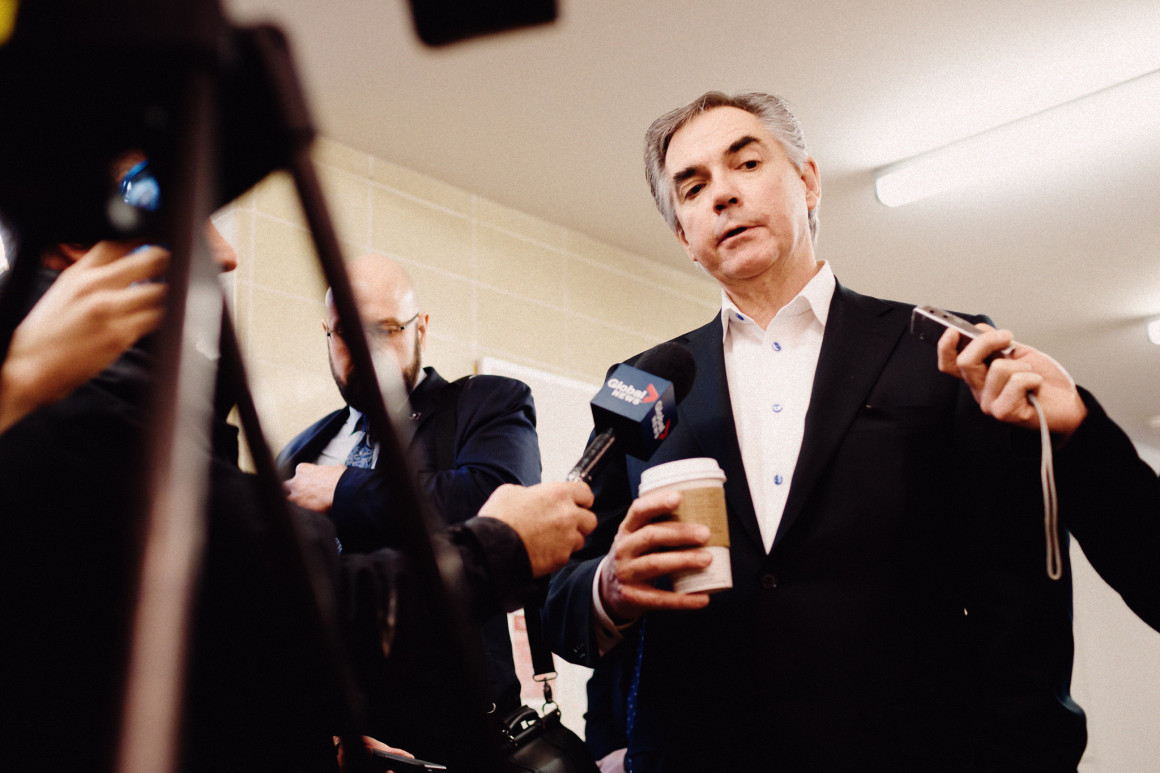
Prentice attends U of C Board of Governors meeting, says there are no “immediate plans” to cut the tuition cap
By Chris Adams, February 27 2015 —
Alberta Premier Jim Prentice and minister of advanced education Don Scott met with the University of Calgary’s Board of Governors on Friday, Feb. 27 to discuss the province’s and university’s finances as budget cuts loom.
The meeting comes amid rumours of cuts to post-secondary funding and the removal of the inflation-tied tuition cap.
The Alberta government is facing a $7-billion revenue shortfall — roughly 20 per cent of the provincial budget — due to the plummeting price of oil. The 2015–16 provincial budget will not be released until the end of March, but minister of finance Robin Campbell said the province will likely impose a nine per cent cut to public spending.
In an interview Friday with Calgary’s News Talk 770, Prentice said the budget will be “the most significant in modern times in the province. It will have impacts on every single person.” He said the budget will be a “10-year plan” designed to lessen the province’s dependancy on fossil-fuel revenue.
Under current regulations in the Post-Secondary Learning Act, universities can only raise tuition at the rate of inflation, which was 2.2 per cent this year. But the tuition cap isn’t written into law, it’s a regulation the government can remove at any time. Student leaders are concerned the government may remove the cap to help universities raise money if budgets are cut.
But Prentice said there are no “immediate plans” to remove the cap and that the minister of advanced education will consult with students on accessibility and affordability.
“That includes tuition, access to student aid, loans and funding as well,” Prentice said.
Scott hasn’t met with the Council of Alberta University Students, the provincial lobby organization for university students, since he took office in September 2014.
Cannon said university officials don’t have any other information on the potential tuition-cap cut, other than what Prentice has said publicly. She said it’s too early to tell if the U of C will increase tuition if the cap is removed.
“You have to look at the budget as a whole and where the various pieces are coming from. We don’t have any indication of what that may look like,” Cannon said. “We’ve always worked very well with student leaders. They’ve always supported our tuition increases over the years.”
However, only one of two student representatives on the Board of Governors voted in favour of this year’s inflation-tied tuition increase.
SU vice-president external and president-elect Levi Nilson said the SU only supports tuition increases that are capped by inflation.
“We don’t approve or condone any kind of tuition increases above and beyond that, which is what we see with the mandatory non-instructional fee and market modifiers,” Nilson said.
The Alberta government cut the U of C’s budget by 7.3 per cent in 2013. University officials prepared various scenarios to prepare for the incoming budget, including a five per cent cut to funding, which Nilson called a “best-case scenario.”
Prentice said the government intends to “maintain core services” including the quality of education in Alberta.
Students’ Union president Jarett Henry, who attended the meeting with Prentice, said the government wants to protect its education, health care and post-secondary portfolios. But he said post-secondary has already weathered the burden of budget cuts.
“Those other two sectors didn’t have the same cut. We need to make the case that it’s important to invest in infrastructure and social capital during these tough times,” Henry said, “but it’s even more important to invest in human capital because education is the way out of this recession. It would be a huge mistake to stop investing in post-secondary.”
The U of C currently funds 23 per cent of its operating budget through tuition and around 50 per cent through the Campus Alberta grant from the provincial budget. Cannon said she wants to ensure access and quality of education at the U of C aren’t compromised, but warned that less provincial funding may mean fewer students on campus.
Henry said the U of C has a severe shortage of spaces for students that will worsen if the government cuts spending.
“We’re getting to the point where entrance averages are increasing to the point where they’re squeezing students out,” Henry said. “Increasing costs, increasing the barriers and reducing the number of spaces available is the worst possible policy.”
Cannon also fielded questions about pay cuts for university executives. Cannon currently makes a total of $732,000 per year, $457,000 from salary. University of Alberta president Indira Samarasekera made over $1.1 million, $554,000 from salary in 2013–14. Southern Alberta Institute of Technology president David Ross made $606,000 in 2013–14, $340,000 from salary.
She said they won’t consider that until the provincial budget is released.
“Those are discussions we really have to have over time. We have to really understand our financial picture. We have to talk to all of our stakeholder groups on campus,” Cannon said.
